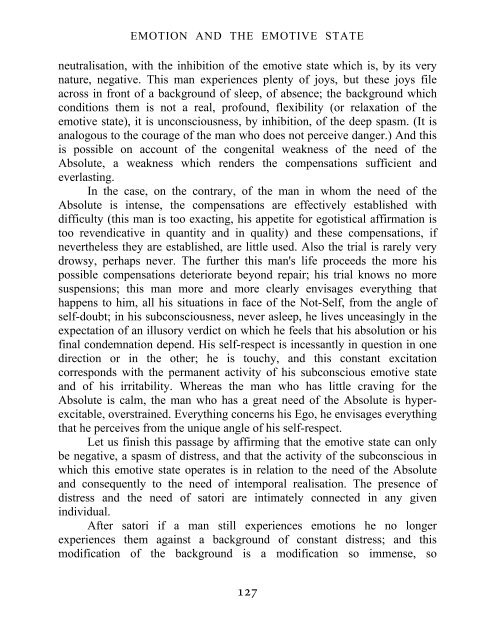The Supreme Doctrine - neo-alchemist
The Supreme Doctrine - neo-alchemist
The Supreme Doctrine - neo-alchemist
Create successful ePaper yourself
Turn your PDF publications into a flip-book with our unique Google optimized e-Paper software.
EMOTION AND THE EMOTIVE STATE<br />
neutralisation, with the inhibition of the emotive state which is, by its very<br />
nature, negative. This man experiences plenty of joys, but these joys file<br />
across in front of a background of sleep, of absence; the background which<br />
conditions them is not a real, profound, flexibility (or relaxation of the<br />
emotive state), it is unconsciousness, by inhibition, of the deep spasm. (It is<br />
analogous to the courage of the man who does not perceive danger.) And this<br />
is possible on account of the congenital weakness of the need of the<br />
Absolute, a weakness which renders the compensations sufficient and<br />
everlasting.<br />
In the case, on the contrary, of the man in whom the need of the<br />
Absolute is intense, the compensations are effectively established with<br />
difficulty (this man is too exacting, his appetite for egotistical affirmation is<br />
too revendicative in quantity and in quality) and these compensations, if<br />
nevertheless they are established, are little used. Also the trial is rarely very<br />
drowsy, perhaps never. <strong>The</strong> further this man's life proceeds the more his<br />
possible compensations deteriorate beyond repair; his trial knows no more<br />
suspensions; this man more and more clearly envisages everything that<br />
happens to him, all his situations in face of the Not-Self, from the angle of<br />
self-doubt; in his subconsciousness, never asleep, he lives unceasingly in the<br />
expectation of an illusory verdict on which he feels that his absolution or his<br />
final condemnation depend. His self-respect is incessantly in question in one<br />
direction or in the other; he is touchy, and this constant excitation<br />
corresponds with the permanent activity of his subconscious emotive state<br />
and of his irritability. Whereas the man who has little craving for the<br />
Absolute is calm, the man who has a great need of the Absolute is hyperexcitable,<br />
overstrained. Everything concerns his Ego, he envisages everything<br />
that he perceives from the unique angle of his self-respect.<br />
Let us finish this passage by affirming that the emotive state can only<br />
be negative, a spasm of distress, and that the activity of the subconscious in<br />
which this emotive state operates is in relation to the need of the Absolute<br />
and consequently to the need of intemporal realisation. <strong>The</strong> presence of<br />
distress and the need of satori are intimately connected in any given<br />
individual.<br />
After satori if a man still experiences emotions he no longer<br />
experiences them against a background of constant distress; and this<br />
modification of the background is a modification so immense, so<br />
127




